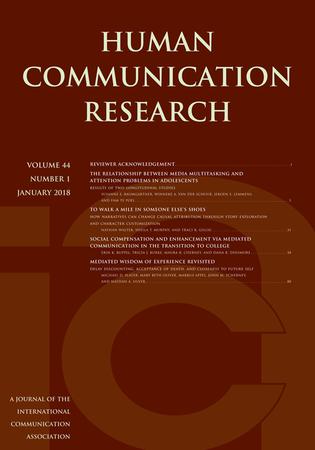欺骗检测和问题效应:在韩国检验真理默认理论预测
IF 4.4
1区 文学
Q1 COMMUNICATION
引用次数: 1
摘要
荟萃分析表明,在欺骗检测实验中,人们在区分真相和谎言方面只比偶然性略胜一筹。然而,真理默认理论(TDT)规定了降低和提高准确性的多种途径。当前实验(n = 81)用来自韩国的学生样本测试了真理默认理论的命题13和诊断性提问模块。该命题和模块预测,受访者被询问的方式会对欺骗检测产生双向影响,从而提高或降低准确性。与最初的发现一致,与荟萃分析结果(54%)相比,提问显著提高(65%)和降低(30%)欺骗检测准确性。目前的研究结果提供了与TDT一致的额外证据,并重复了先前的研究结果,记录了对欺骗检测准确性的实质性问题影响。讨论了问题效应对非母语人士和跨文化测谎的影响。本文章由计算机程序翻译,如有差异,请以英文原文为准。
Deception detection and question effects: testing truth-default theory predictions in South Korea
Meta-analysis has shown that people are only slightly better than chance at distinguishing truths from lies in deception detection experiments. Truth-default theory (TDT), however, specifies multiple paths to lowering and increasing accuracy. The current experiment (n = 81) tested truth-default theory’s proposition 13 and diagnostic questioning module with a student sample from South Korea. The proposition and module predict that how an interviewee is questioned can affect deception detection in both directions, improving or reducing accuracy. Consistent with the original findings, questioning was found to significantly enhance (65%) and reduce (30%) deception-detection accuracy relative to the results of meta-analysis (54%). The current findings provide additional evidence consistent with TDT and replicate prior findings documenting substantial question effect on deception-detection accuracy. The implications of question effects for non-native speakers and intercultural lie detection are discussed.
求助全文
通过发布文献求助,成功后即可免费获取论文全文。
去求助
来源期刊

Human Communication Research
COMMUNICATION-
CiteScore
8.20
自引率
2.00%
发文量
28
期刊介绍:
Human Communication Research is one of the official journals of the prestigious International Communication Association and concentrates on presenting the best empirical work in the area of human communication. It is a top-ranked communication studies journal and one of the top ten journals in the field of human communication. Major topic areas for the journal include language and social interaction, nonverbal communication, interpersonal communication, organizational communication and new technologies, mass communication, health communication, intercultural communication, and developmental issues in communication.
 求助内容:
求助内容: 应助结果提醒方式:
应助结果提醒方式:


